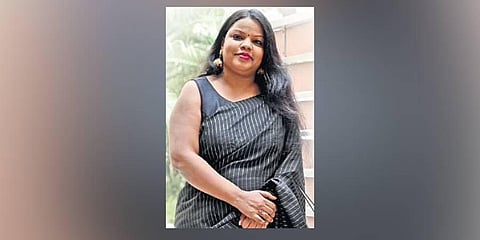

CHENNAI: Shalin Maria Lawrence, a 21-year-old Dalit woman raised in the slums on the riverbank in Vadachennai, the north of erstwhile Madras, has seen the shackles of oppression from very close quarters. Her marriage into a household outside of her community didn’t go the way she imagined it to be, and soon, it turned out to be nothing short of a hell.
“I used to be beaten up black and blue. Hurling caste slurs was an everyday affair. There were two suicides due to domestic violence in my own family. Divorce, however, was a dreaded word,” recalls the 39-year-old writer, who ruptured the wall of stigma by going against the family will. She turned her attention towards her career, and left Vadachennai for a restart.
She made a return to the place during the 2015 floods, which, when she looks back, changed everything. The women close to her home were suffering from nature’s fury without access to toilets and sanitation facilities. “Only my life had changed, the women here were all living the same nightmare,” she says.
Joining hands with Kathir, the founder of Evidence Group from Madurai, renowned for his work towards Dalit and tribal welfare, Shalin began reminding the women of their rights. Before this, she attended workshops on caste and gender-based violence, took lessons from mentors and like-minded people.
“One of my biggest realisations from the training sessions was that women didn’t realise they were being discriminated against. Most of them were enslaved, undergoing passive forms of violence. We would talk guide them about the legal measures,” says Shalin, showing a barrage of social media messages by domestic abuse survivors.
The uniformity and the scale of unnoticed violence was revealed to her when she travelled to the slums of Dharavi and tribal areas of TN. Shalin met many women, who were oppressed at multiple levels — caste, class, and gender. “A girl was married off when she was 20 years old. After enduring domestic abuse for five years, she called me one day and said she wanted to kill herself to end the torture. We helped her walk out of the marriage and rekindled her passion,” she said.
When TNIE contacted the girl, she said, “The strength I got when I became free cannot be explained in words. Just the fact that I could do anything I wanted without being enslaved was a dream come true.” Many a life has taken a turn to a better world, thanks to the efforts of Shalin. She published a subaltern feminist take on history, contemporary politics, society and culture in her book ‘Vadachennaikaari’. ‘Jensyean kuraivaga paadinaar’ dealt with a feminist take on cinema and ‘Sandaikkarigal’ explored intersectional feminism.
Another woman, who was inspired by Shalin’s books, shared her experiences, “I convinced my family on how my life is more important over an abusive marriage. I mustered the courage to leave my house and start anew.”
Bringing the submerged calamity of caste hierarchy, the full-time writer, orator and gender trainer continues to work with ‘Evidence’, exposing discriminatory practices through facts. The group’s research has revealed that 86% of eateries in TN’s tribal and rural areas still practise the 2-tumbler system (glasses given separately based on one’s caste). Another research showed 91% of shops did not allow Dalits to have a seat and 98% of the surveyed villages had separate burial grounds and preferred Dalit workers to do low-paying jobs.
“Caste hierarchy is one of those structures that is still tethering the State to a deep-set foundation of patriarchy, misogyny, power politics, and discrimination,” says Shalin, echoing Dr Ambedkar’s vision to educate, agitate and organise.